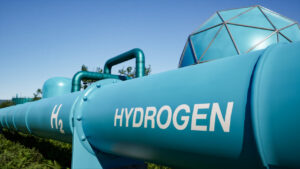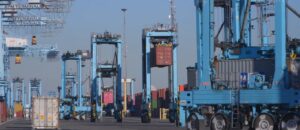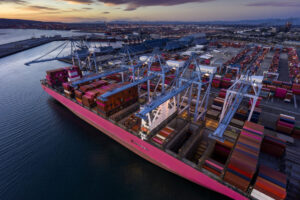The World Benchmarking Alliance (WBA) has published its new analysis “Transport Benchmark” highlighting gaps across the transport sector in developing and scaling sustainable alternatives to fossil fuels.
The analysis comprises 90 companies – including 17 shipping companies and 33 multimodal companies.
Transport has the highest reliance on fossil fuels of all sectors, with more than 90 per cent of transport energy coming from crude oil-derived products.
Despite this, WBA found that only 7 per cent of companies assessed have committed to phasing out fossil fuels, whilst 85 per cent currently have fleets which are incompatible with a low-carbon future and the majority fail to disclose any plans for changing this.
Danish giant carrier Maersk features among the top five performing across the Transport Benchmark.
The company recently ordered six large ocean-going vessels that can be fuelled on green methanol.
According to the benchmarkings, some of the solutions that transport operators need to adopt – such as alternative fuels and cleaner vehicles – are still in early development and analysis showed that on average only 0.3 per cent of total transport related revenues are invested in research and development (R&D) into green alternatives.
Only 3 out of 90 assessed companies showed significant support for low-carbon policy and just 6 directly work with infrastructure operators to build low-carbon solutions.
READ: Maersk shows endorsement to green shipping bill
“Transport accounts for 37 per cent of global carbon emissions, so the sector has to step up if we are to keep 1.5 alive,” said Vicky Sins, World Benchmarking Alliance’s Decarbonisation and Energy Transformation Lead, referring to the COP 26 target to limit global warming, avoiding the 1.5 degrees Celcius increase.
“The large-scale change needed cannot be achieved without every company getting actively involved across their business – from research to customer advice to support for low-carbon policies and regulation.
“It is no exaggeration to say the future of our world will be significantly shaped by how these companies translate pledges into action.”
READ: Port of Long Beach joins hydrogen fuelling partnership
The research, in partnership with private data firm CDP, used the Assessing low-Carbon Transition (ACT) methodology that drives climate action by benchmarking companies against advanced, science-based metrics.
“Companies must go further in setting not only long-term targets, but near-term targets and credible climate transition plans to demonstrate how they are going to reach these targets, currently only 51 per cent of companies within the benchmark have net-zero targets,” added Amir Sokolowski, CDP’s Global Director of Climate Change.
“These plans must be disclosed so they can be measured and managed. This is not happening across the sector.
“This means that vital risks are not being assessed or addressed, and all players could be left behind as we see a rise in regulation on mandatory disclosure.”








